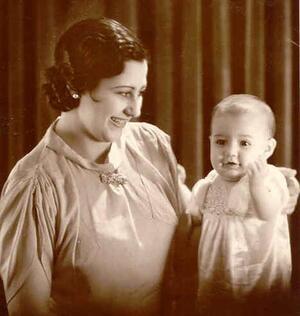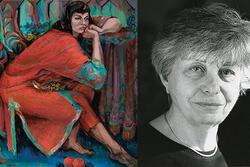Am I Glad My Mother Didn’t Abort Me?
Part 6 of the series Reading Our Rights.
I have one rule when it comes to writing opinion pieces: Never read the comments. After writing an article on reproductive rights, I found the commenters to be particularly persistent. One left a screed on my personal Facebook page about how we treated puppies better than fetuses in this country. The flaws in his argument made my head spin, but I was able to quickly delete it and mostly forget it.
It was harder to ignore the handwritten letter that arrived at my office.
Every time I look at it, it occurs to me that someone took the time to take out a piece of stationery, an envelope, and a stamp, in order to write to me in meticulous handwriting (Catholic school handwriting, a friend pointed out).
Come Holy Spirit.
Dear Rabbi Berkowitz,
Your column on Women’s reproductive rights was very sad. Does the baby in the womb have no rights? Many people want to adopt—a woman who does not want the baby should not take the baby’s Life, but be willing to have the baby adopted. One baby killed, kills many generations. Abortion is killing and is never necessary—“Thou shalt not kill.” Natural Family Planning allows couples to plan pregnancies.
With Prayers,
____________________
(Mother of Eleven)
Then, written neatly on the side of the page, Are you glad your Mother didn’t abort you? This is probably the most well-thought-out, and least hateful, of the letters I’ve received on this topic. Putting aside how ludicrous it is to suggest that using the rhythm method would eliminate the need for abortion, her civility made me almost nostalgic for life before the internet. But it was this strange postscript that tempted me to take out my own stationery and stamp, and write back.
Dear Mrs. _______,
Am I glad my mother didn’t abort me? The answer is more complicated than you might think.
When my mother married my father, she had a college degree, a driver’s license, and a diaphragm. When she became pregnant for the first time, she had a working husband and her own job as a Labor and Delivery nurse. She had the financial resources to stay at home the majority of the time that my two brothers and I were growing up, and great public schools to send us to in our neighborhood. She had access to, and coverage for, reproductive health care for herself, and health care for her children. Until our society provides these resources to every woman, and family, in the United States, we are not doing right by the children we bring into the world.
My mother is the exception, not the rule. She and my father have stayed married for 42 years, and, in spite of a few health scares, they’ve both stuck around to care for us. My mother had three healthy pregnancies in her lifetime, all planned, all carried to term without incident. She never had a birth control method fail, never discovered a genetic anomaly (there are 19 genetic diseases possible just for those of Ashkenazic Jewish descent) that would sentence one of her children to a short, pain-filled life. She never had to make the heartbreaking choice of terminating a much-wanted pregnancy in order to prevent further suffering for herself, the fetus, or her other children.
If, for some reason, she had decided to give one of us up for adoption, she could have been fairly confident that we would immediately be placed in permanent families. That isn’t true for the 8-12 million children living in orphanages and foster homes around the world. And if my mother hadn't wanted to have me at all, I would have wanted her to have that choice. Because even with every privilege in the world, even knowing I was loved every minute of my life, I saw how hard it was to be the primary caregiver for three children, to plan to send them to college, and, in this economy, to be prepared to offer financial support even in adulthood. I watched my father make career choices based, at least in part, on how he would fund our education, even though that meant he had to travel for work every week and be away from the family he loved so much.
I would never have wanted to live with the burden of knowing that this was not their choice.
I admire very much that you chose to have eleven children. I hope every one of them grew up with as much love and support as I did, and that they have shown ample gratitude to you for giving them life and raising them.
Blessings,
Rabbi Leah R. Berkowitz








!!! Do you actually think you can tell "Catholic school handwriting," from a Jew's handwriting? In other words, you can't imagine that a Jew wrote that letter. "One baby killed, kills many generations", it said. You don't see the Jewish source for that sentence? I've never heard that thought from a non-Jew.
Very well said, Rabbi! One thing I would add, is that the argunment that a woman should go through a pregnancy to benefit someone who can't have kids is the worst possible argument for an anti-abortion stance. No woman should have to be a baby mill for others.
Rabbi Berkowitz: Both letters are well written and forcefully set forth the arguments of both sides. However those who produce more children (Orthodox) will clearly in a few years be in the majority and those voices will dominate the debate.
Hello Leah, I was very impressed about the TONE of your letter to a woman who obviously doesn't believe in BIRTH CONTROL. YOU concentrated on how lucky youi were growing up and how not all people have that luxery. You didn't attack her beliefs but very gently did mention genetic diseases. Well done. I am sure by now you know this is you great aunt . Love to all Barbara Levine Rovin
Excellent piece. As someone who was born before Roe V Wade, I realize that my biological mother had no choice. I'm also adopted. I've had a few people over the years, not knowing that, ask me the same question. Or had people defend their own anti-choice stand by virtue of their being adopted. So I very much understand the complicated nature of the question. Am I glad I wasn't aborted? Well, sure, I like myself and am quite happy I'm alive and think, in my best moments, that the world is better off with me in it. Do I wish she had the choice? Yes, absolutely.